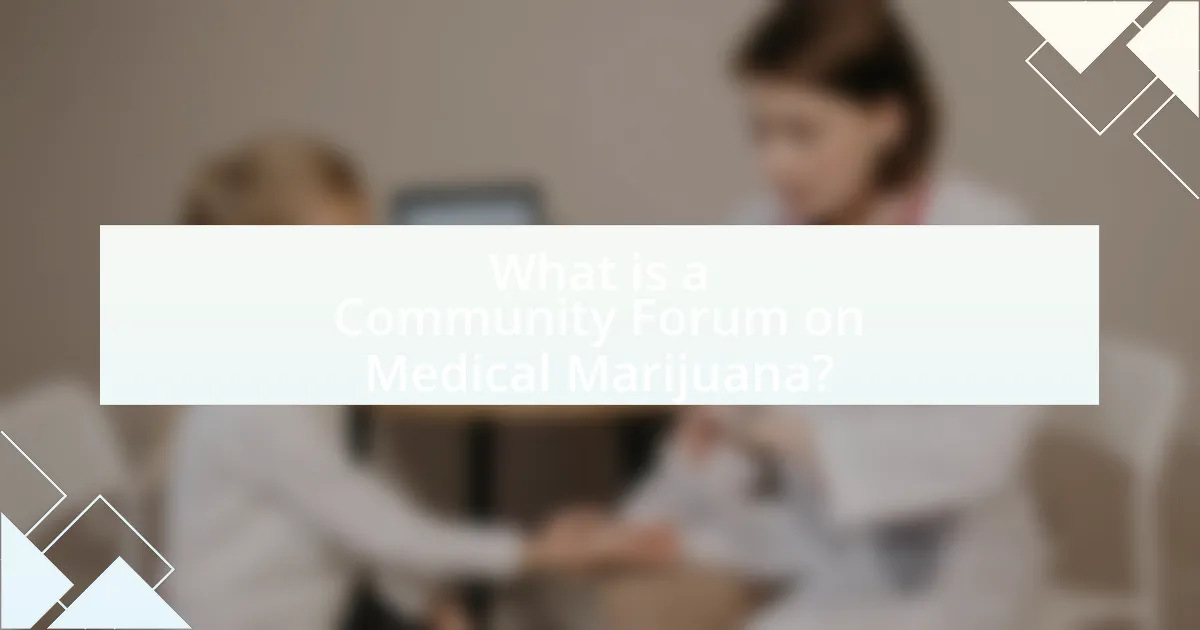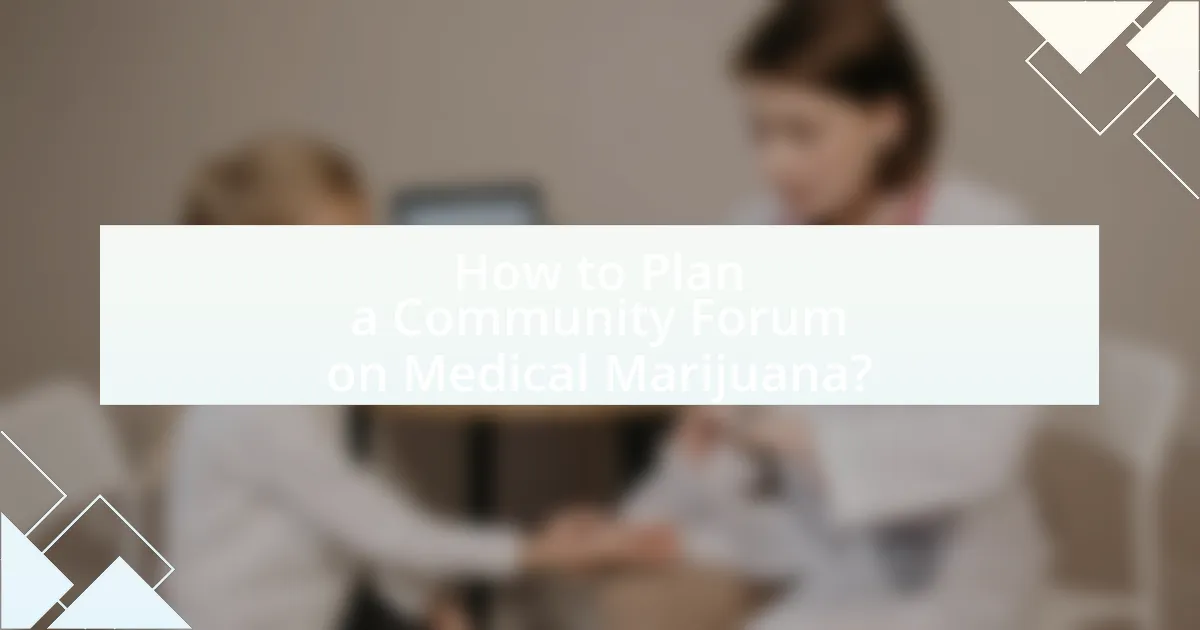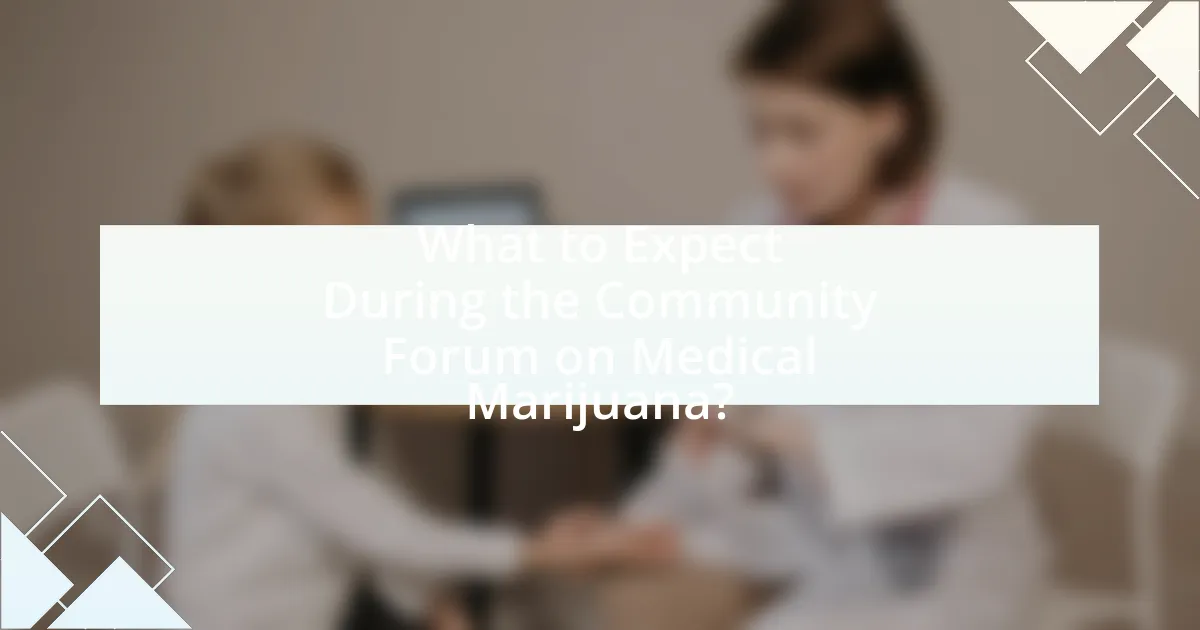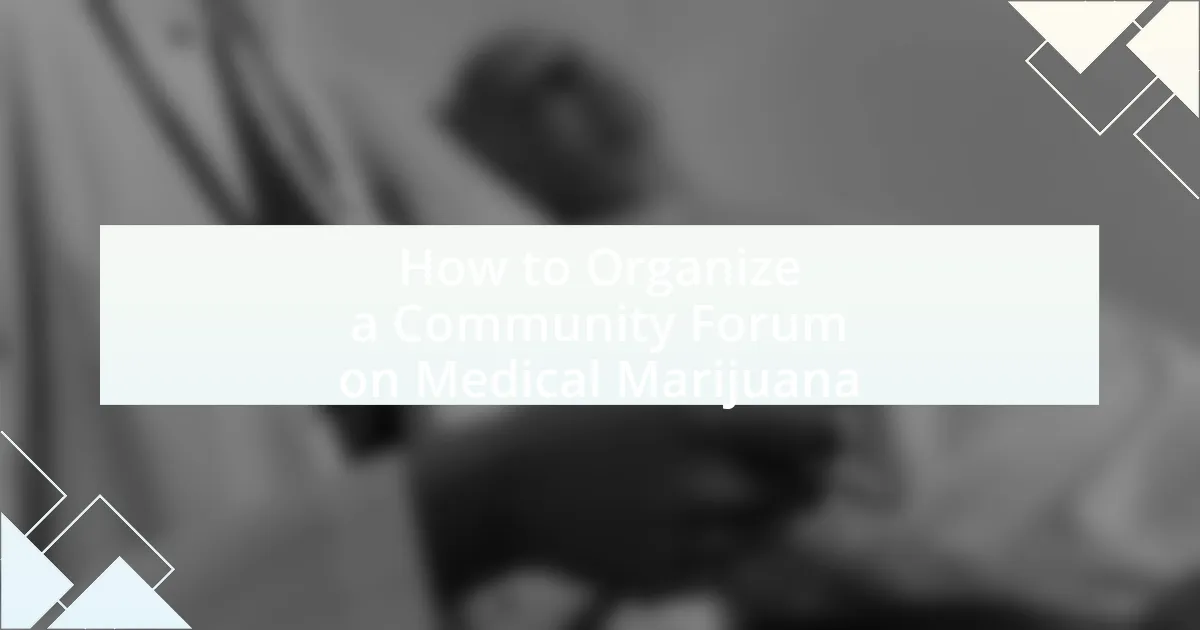A Community Forum on Medical Marijuana serves as a platform for discussing the use, benefits, and regulations of medical marijuana, involving patients, healthcare professionals, advocates, and policymakers. Organizing such forums is crucial for fostering open dialogue, educating the public, and addressing misconceptions, ultimately impacting public perception and acceptance of medical marijuana. Key objectives include educating attendees about medical marijuana’s therapeutic uses, facilitating discussions among stakeholders, and gathering community input on local policies. The article outlines essential steps for planning a successful forum, including selecting appropriate speakers, promoting the event, and creating an inclusive environment, while also addressing common challenges and strategies for effective engagement.

What is a Community Forum on Medical Marijuana?
A Community Forum on Medical Marijuana is a gathering where individuals discuss topics related to the use, benefits, and regulations of medical marijuana. These forums typically involve patients, healthcare professionals, advocates, and policymakers sharing information, experiences, and resources. The purpose of such forums is to educate the community, address concerns, and promote understanding of medical marijuana’s role in healthcare. Evidence of their effectiveness can be seen in various states where community forums have led to increased awareness and support for medical marijuana legislation, fostering informed discussions among stakeholders.
Why is organizing a community forum important for medical marijuana discussions?
Organizing a community forum is important for medical marijuana discussions because it facilitates open dialogue among stakeholders, including patients, healthcare providers, and policymakers. This engagement allows for the sharing of diverse perspectives, which can lead to better understanding and education about medical marijuana’s benefits and risks. Research indicates that community forums can enhance public awareness and acceptance, as seen in studies where community engagement improved knowledge and attitudes towards medical marijuana use (e.g., “Community Engagement and Public Attitudes Toward Medical Marijuana,” Journal of Drug Issues, 2020). By creating a space for discussion, forums can also address misconceptions and promote informed decision-making regarding medical marijuana policies and practices.
What are the key objectives of a community forum on medical marijuana?
The key objectives of a community forum on medical marijuana are to educate the public about its benefits and risks, facilitate open discussions among stakeholders, and gather community input on local policies. Education is crucial as it provides accurate information regarding medical marijuana’s therapeutic uses, potential side effects, and legal status, which can help dispel myths and reduce stigma. Facilitating discussions allows patients, healthcare providers, and policymakers to share experiences and insights, fostering a collaborative environment. Gathering community input is essential for understanding public sentiment and shaping policies that reflect the needs and concerns of the community, ensuring that regulations are informed by those directly affected.
How can a community forum impact public perception of medical marijuana?
A community forum can significantly impact public perception of medical marijuana by providing a platform for open dialogue and education. Through discussions, community members can share personal experiences, ask questions, and address misconceptions about medical marijuana, which can lead to increased understanding and acceptance. Research indicates that community engagement initiatives, such as forums, can effectively shift public attitudes; for example, a study published in the Journal of Drug Issues found that community discussions about marijuana led to more favorable views on its medical use among participants. This demonstrates that forums can play a crucial role in shaping perceptions by fostering informed conversations and reducing stigma associated with medical marijuana.
Who should be involved in organizing a community forum on medical marijuana?
Local health officials, community leaders, medical professionals, and representatives from advocacy groups should be involved in organizing a community forum on medical marijuana. Local health officials can provide insights on regulations and health impacts, while community leaders can help mobilize residents and ensure diverse participation. Medical professionals can offer expert knowledge on the therapeutic uses and safety of medical marijuana. Advocacy group representatives can share patient experiences and promote awareness about medical marijuana’s benefits and challenges. This collaborative approach ensures a well-rounded discussion that addresses community concerns and fosters informed dialogue.
What roles do community leaders play in the organization?
Community leaders play crucial roles in the organization by facilitating communication, mobilizing resources, and fostering community engagement. They serve as liaisons between the organization and the community, ensuring that the needs and concerns of community members are addressed. Additionally, community leaders often help to organize events, such as forums, by leveraging their networks to attract participants and speakers. Their involvement can enhance credibility and trust, as they are often respected figures within the community. Research indicates that effective community leadership can significantly improve participation rates and the overall success of community initiatives, as seen in various case studies on community engagement strategies.
How can medical professionals contribute to the forum?
Medical professionals can contribute to the forum by sharing their expertise on medical marijuana, including its benefits, risks, and appropriate usage. Their participation can enhance the credibility of the forum, as they provide evidence-based information that can guide community members in making informed decisions. For instance, studies have shown that healthcare providers play a crucial role in educating patients about medical marijuana, which can lead to better health outcomes and increased patient safety.
What topics should be covered in a community forum on medical marijuana?
A community forum on medical marijuana should cover topics such as the legal status of medical marijuana, its medical benefits and risks, patient testimonials, dosing and administration methods, and the latest research findings. The legal status is crucial as it varies by region and affects access; for instance, as of 2023, 38 states in the U.S. have legalized medical marijuana in some form. Discussing medical benefits and risks is essential for informed decision-making, supported by studies indicating that medical marijuana can alleviate chronic pain and reduce nausea in chemotherapy patients. Patient testimonials provide real-world insights into the effectiveness and challenges of using medical marijuana. Dosing and administration methods are vital for safe use, with various forms available such as oils, edibles, and vaporizers. Lastly, covering the latest research findings ensures that participants are aware of evolving knowledge and practices in the field.
What are the legal considerations surrounding medical marijuana?
The legal considerations surrounding medical marijuana include compliance with state laws, federal regulations, and local ordinances. Each state has its own laws governing the use, distribution, and cultivation of medical marijuana, which can vary significantly; for example, some states require a prescription from a licensed physician, while others allow for a broader range of qualifying conditions. Additionally, under federal law, marijuana remains classified as a Schedule I controlled substance, which complicates legal status and enforcement. This federal classification can lead to conflicts between state and federal laws, impacting issues such as banking, taxation, and employment for those involved in the medical marijuana industry. Understanding these legal frameworks is crucial for anyone participating in or organizing discussions about medical marijuana.
How can patient experiences be shared effectively?
Patient experiences can be shared effectively through structured community forums that facilitate open dialogue and storytelling. These forums should provide a safe environment where patients can discuss their experiences with medical marijuana, allowing for both personal narratives and collective insights. Research indicates that peer-led discussions enhance engagement and understanding, as seen in studies like “The Role of Patient Narratives in Health Care” published in the Journal of Health Communication, which highlights the impact of shared experiences on patient education and support. By utilizing platforms that encourage interaction, such as workshops or online discussion groups, patients can connect, share valuable information, and foster a sense of community.

How to Plan a Community Forum on Medical Marijuana?
To plan a community forum on medical marijuana, first identify the objectives and target audience for the event. This involves determining whether the forum aims to educate the public, discuss policy changes, or share personal experiences related to medical marijuana use. Next, secure a suitable venue that can accommodate the expected number of attendees and is accessible to all community members.
Then, assemble a panel of knowledgeable speakers, such as medical professionals, legal experts, and advocates, to provide diverse perspectives on the topic. Promote the event through local media, social media platforms, and community organizations to ensure broad outreach.
Finally, prepare materials for attendees, such as informational brochures and resources on medical marijuana, and establish a system for collecting feedback after the forum to assess its impact and gather suggestions for future events.
What steps are necessary to plan a successful community forum?
To plan a successful community forum, first identify the purpose and goals of the forum, ensuring they align with community interests. Next, select a suitable date, time, and location that accommodates the target audience, considering accessibility and convenience. Then, develop a structured agenda that includes key topics, speakers, and time allocations to facilitate discussion. Promote the event through various channels, such as social media, local organizations, and community boards, to maximize attendance. Finally, gather feedback post-event to assess the forum’s effectiveness and identify areas for improvement. These steps are essential for creating an engaging and productive community forum, as evidenced by successful events that prioritize clear objectives, effective promotion, and participant feedback.
How do you choose an appropriate venue for the forum?
To choose an appropriate venue for the forum, assess the venue’s capacity, accessibility, and facilities. The venue must accommodate the expected number of attendees comfortably, ensuring that it is easily reachable by public transport and has adequate parking options. Additionally, the venue should provide necessary amenities such as audio-visual equipment, seating arrangements, and restrooms. Research indicates that venues with good accessibility can increase attendance by up to 30%, highlighting the importance of these factors in venue selection.
What is the importance of setting a date and time for the event?
Setting a date and time for an event is crucial as it establishes a clear schedule for participants and organizers, ensuring effective planning and attendance. A well-defined date and time allow for better promotion, enabling potential attendees to allocate their time accordingly and increasing the likelihood of higher turnout. Research indicates that events with clearly communicated schedules tend to attract more participants, as individuals can plan their commitments around the event. For instance, a study by the Event Marketing Institute found that 78% of attendees prefer events with a set date and time, highlighting the importance of this aspect in event organization.
How can you promote the community forum effectively?
To promote the community forum effectively, utilize targeted social media campaigns to reach potential participants interested in medical marijuana. Research indicates that 72% of adults use social media, making it a powerful tool for engagement. Create informative posts that highlight the benefits of the forum, share success stories, and encourage discussions around medical marijuana topics. Additionally, collaborate with local health organizations and influencers in the medical marijuana space to expand reach and credibility. This approach not only increases visibility but also fosters a sense of community among participants.
What channels are best for reaching the target audience?
The best channels for reaching the target audience in organizing a community forum on medical marijuana include social media platforms, local community centers, and email newsletters. Social media platforms like Facebook and Instagram allow for targeted advertising and community engagement, reaching individuals interested in medical marijuana discussions. Local community centers serve as physical venues for outreach and can facilitate in-person interactions, enhancing community involvement. Email newsletters provide a direct line of communication to interested parties, ensuring that updates and information about the forum are effectively disseminated. These channels have been shown to increase participation and awareness in community events, particularly in niche topics like medical marijuana.
How can social media be utilized for promotion?
Social media can be utilized for promotion by creating targeted campaigns that engage specific audiences interested in medical marijuana. Platforms like Facebook, Instagram, and Twitter allow organizations to share informative content, host live discussions, and promote events, reaching a wider audience effectively. For instance, a study by the Pew Research Center indicates that 69% of adults in the U.S. use social media, making it a powerful tool for outreach. Additionally, using hashtags related to medical marijuana can increase visibility and engagement, as evidenced by the increased interaction rates seen in campaigns that effectively leverage trending topics.
What resources are needed to host a community forum on medical marijuana?
To host a community forum on medical marijuana, essential resources include a suitable venue, promotional materials, knowledgeable speakers, and necessary permits. A venue should accommodate the expected audience size and provide accessibility. Promotional materials, such as flyers and social media posts, are crucial for attracting participants and informing them about the event. Knowledgeable speakers, including medical professionals or advocates, enhance the forum’s credibility and provide valuable insights. Additionally, obtaining permits ensures compliance with local regulations regarding public gatherings and discussions on medical marijuana.
What materials should be prepared for attendees?
Attendees should be provided with informational brochures, agendas, and feedback forms. Informational brochures should cover key topics related to medical marijuana, including its benefits, legal status, and usage guidelines. Agendas will help attendees follow the schedule of events and know what to expect throughout the forum. Feedback forms are essential for gathering attendee opinions and suggestions, which can improve future events. These materials enhance engagement and ensure that participants leave with valuable information.
How can technology enhance the forum experience?
Technology can enhance the forum experience by providing tools for real-time communication, data organization, and user engagement. Features such as live chat, video conferencing, and instant messaging facilitate immediate interaction among participants, fostering a sense of community. Additionally, advanced algorithms can curate content based on user interests, ensuring that relevant discussions are easily accessible. For instance, platforms like Reddit utilize machine learning to recommend threads, which increases user participation and satisfaction. Furthermore, analytics tools can track user behavior, allowing forum organizers to adapt content and structure based on community needs, ultimately improving the overall experience.

What to Expect During the Community Forum on Medical Marijuana?
During the Community Forum on Medical Marijuana, attendees can expect discussions on the benefits, regulations, and community impact of medical marijuana. The forum typically includes presentations from medical professionals, legal experts, and patient advocates who provide insights into the therapeutic uses of medical marijuana and its legal status. Additionally, participants will have opportunities to ask questions and share personal experiences, fostering a collaborative environment for learning and dialogue. This format encourages community engagement and helps address concerns regarding medical marijuana use, ensuring that all voices are heard in the conversation.
How should the agenda be structured for the forum?
The agenda for the forum should be structured to include an introduction, expert presentations, panel discussions, audience Q&A, and a conclusion. This structure ensures that participants are informed, engaged, and able to interact with experts.
The introduction should outline the purpose of the forum and set the context for discussions on medical marijuana. Expert presentations should cover key topics such as medical benefits, legal considerations, and patient experiences, providing attendees with factual information.
Panel discussions can facilitate deeper exploration of specific issues, allowing for diverse perspectives. An audience Q&A session is crucial for addressing community concerns and fostering dialogue. Finally, a conclusion should summarize key takeaways and outline next steps for community involvement. This structured approach enhances clarity and effectiveness in conveying important information about medical marijuana.
What types of speakers should be invited?
Invite medical professionals, legal experts, and patient advocates as speakers for a community forum on medical marijuana. Medical professionals can provide evidence-based information on the therapeutic benefits and risks of medical marijuana, while legal experts can clarify the legal landscape and regulations surrounding its use. Patient advocates can share personal experiences and insights, fostering a deeper understanding of the impact of medical marijuana on individuals’ lives. This diverse range of speakers ensures a comprehensive discussion that addresses various aspects of medical marijuana, enhancing the forum’s educational value.
How can interactive sessions be incorporated into the agenda?
Interactive sessions can be incorporated into the agenda by allocating specific time slots for activities such as Q&A segments, group discussions, and hands-on demonstrations. These sessions encourage participant engagement and facilitate knowledge sharing, which is essential in a community forum on medical marijuana. For instance, dedicating 30 minutes for a Q&A after each speaker allows attendees to clarify doubts and share experiences, enhancing the overall learning experience. Research indicates that interactive formats can increase retention of information by up to 60%, making them a valuable addition to any agenda.
What are the best practices for facilitating discussions during the forum?
The best practices for facilitating discussions during a forum include establishing clear guidelines, encouraging participation, and actively managing the conversation. Clear guidelines set expectations for respectful dialogue and time limits, which helps maintain focus. Encouraging participation involves inviting diverse viewpoints and ensuring that all voices are heard, which fosters a more inclusive environment. Actively managing the conversation means guiding discussions back on track when they stray and addressing any conflicts that arise, ensuring a productive atmosphere. These practices are supported by research indicating that structured discussions lead to more effective outcomes and participant satisfaction in community forums.
How can moderators encourage participation from attendees?
Moderators can encourage participation from attendees by creating an inclusive and engaging environment. They can achieve this by actively inviting questions and comments, using open-ended prompts to stimulate discussion, and acknowledging contributions from participants to foster a sense of belonging. Research shows that when moderators employ techniques such as direct engagement and positive reinforcement, attendees are more likely to participate, as evidenced by a study published in the Journal of Communication, which found that interactive moderation significantly increases audience involvement in discussions.
What techniques can be used to manage differing opinions?
To manage differing opinions, techniques such as active listening, mediation, and structured dialogue can be employed. Active listening involves fully concentrating on the speaker, understanding their message, and responding thoughtfully, which fosters respect and understanding among participants. Mediation can facilitate discussions by involving a neutral third party to help navigate conflicts and find common ground. Structured dialogue, which includes setting clear guidelines for discussions and encouraging participants to express their views in a respectful manner, can also help maintain focus and civility during debates. These techniques are effective in creating an inclusive environment where diverse perspectives can be shared and addressed constructively.
What follow-up actions should be taken after the forum?
After the forum, the primary follow-up action is to gather and analyze feedback from participants to assess the effectiveness of the event. This can be achieved through surveys or direct communication, allowing organizers to understand attendees’ perspectives and areas for improvement. Additionally, sharing a summary of the forum’s discussions and outcomes with participants reinforces engagement and transparency. This practice is supported by research indicating that post-event communication enhances community trust and participation in future events.
How can feedback be collected from participants?
Feedback can be collected from participants through surveys, interviews, and focus groups. Surveys can be distributed online or in person, allowing participants to provide structured responses to specific questions about their experiences and opinions. Interviews offer a more in-depth understanding by facilitating one-on-one conversations, enabling participants to express their thoughts in detail. Focus groups gather a small group of participants to discuss their views collectively, fostering interaction and generating diverse insights. These methods are effective as they allow for both quantitative and qualitative data collection, ensuring a comprehensive understanding of participant feedback.
What steps can be taken to maintain community engagement post-forum?
To maintain community engagement post-forum, organizers should implement regular follow-up communications, such as newsletters or social media updates, to keep participants informed and involved. This approach fosters ongoing dialogue and encourages feedback, which is essential for sustaining interest. Research indicates that consistent communication can increase community participation by up to 30%, as it reinforces the value of community input and involvement. Additionally, creating opportunities for continued interaction, such as workshops or discussion groups, can further enhance engagement by providing platforms for deeper exploration of topics discussed during the forum.
What are some common challenges in organizing a community forum on medical marijuana?
Common challenges in organizing a community forum on medical marijuana include legal restrictions, community stigma, and diverse stakeholder interests. Legal restrictions can complicate the planning process, as regulations surrounding medical marijuana vary significantly by location, potentially limiting the forum’s scope and content. Community stigma often leads to reluctance among participants to engage openly, which can hinder meaningful discussions and limit attendance. Additionally, diverse stakeholder interests, including those of patients, healthcare providers, and local government, can create conflicts that complicate consensus-building and the overall organization of the event.
How can organizers address misinformation about medical marijuana?
Organizers can address misinformation about medical marijuana by providing accurate, evidence-based information through educational resources and expert-led discussions. This approach ensures that community members receive reliable data, such as studies showing the efficacy of medical marijuana for conditions like chronic pain and epilepsy, which have been documented in research published in journals like the Journal of Pain and the Epilepsy Journal. Additionally, organizers can facilitate Q&A sessions with healthcare professionals to clarify misconceptions and encourage open dialogue, thereby fostering a well-informed community.
What strategies can be employed to handle opposition or controversy?
To handle opposition or controversy in organizing a community forum on medical marijuana, employ strategies such as open dialogue, fact-based education, and stakeholder engagement. Open dialogue allows for the expression of differing viewpoints, fostering an environment of respect and understanding. Fact-based education involves presenting scientific research and data on medical marijuana’s benefits and risks, which can help dispel myths and misinformation. Engaging stakeholders, including healthcare professionals, patients, and community leaders, ensures diverse perspectives are considered and can lead to more informed discussions. These strategies are effective as they promote transparency and build trust within the community, ultimately leading to more constructive conversations around the topic.
What tips can help ensure a successful community forum on medical marijuana?
To ensure a successful community forum on medical marijuana, it is essential to establish clear objectives and guidelines for the discussion. Setting specific goals helps participants understand the purpose of the forum, whether it is to educate, share experiences, or advocate for policy changes. Additionally, inviting knowledgeable speakers, such as medical professionals or legal experts, can provide credible information and foster informed discussions.
Promoting the event through various channels, including social media, local community boards, and healthcare facilities, increases attendance and engagement. Creating a welcoming and inclusive environment encourages open dialogue, allowing participants to express their views and ask questions without fear of judgment.
Finally, providing resources, such as pamphlets or links to reputable websites, can help attendees access further information on medical marijuana, reinforcing the forum’s educational aspect. These strategies collectively contribute to a productive and impactful community forum.
How can organizers create an inclusive environment for all attendees?
Organizers can create an inclusive environment for all attendees by implementing accessibility measures, ensuring diverse representation, and fostering open communication. Accessibility measures include providing wheelchair access, sign language interpreters, and materials in multiple languages, which cater to individuals with disabilities and non-native speakers. Diverse representation can be achieved by inviting speakers and panelists from various backgrounds, including different ethnicities, genders, and experiences related to medical marijuana, which enriches the discussion and makes all attendees feel represented. Fostering open communication involves creating safe spaces for dialogue, encouraging questions, and actively seeking feedback from attendees, which promotes engagement and ensures that all voices are heard. These strategies collectively enhance inclusivity and participation in community forums.
What are the key takeaways for future forums based on this experience?
Future forums on medical marijuana should prioritize clear communication and community engagement. Effective forums have demonstrated that providing accurate information and addressing community concerns fosters trust and participation. For instance, successful past forums included expert speakers who clarified medical benefits and legal implications, leading to increased attendance and informed discussions. Additionally, incorporating feedback mechanisms allows organizers to adapt future events to better meet community needs, as evidenced by surveys conducted post-event that highlighted areas for improvement.

Leave a Reply